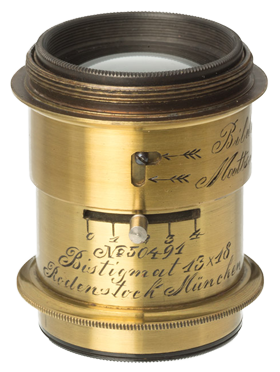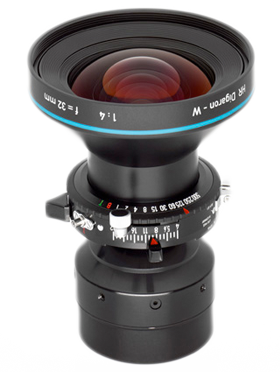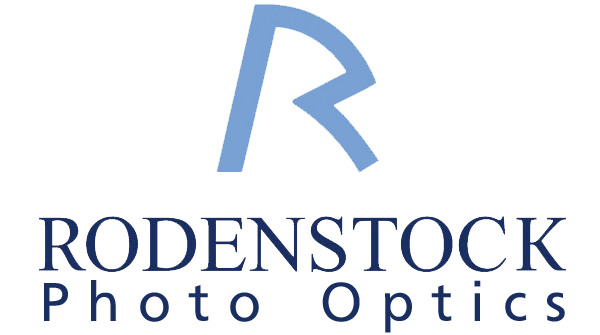Our HISTORY
Josef Rodenstock founded the company 1877 with the first fine-mechanical workshop in Wuerzburg, Germany. Nobody could suspect at that time that he would become the founder of a well known world-wide optical company. By 1891 120 employees worked for the company. They produced eyeglasses and binoculars, microscopes, telescopes etc. also numerous cameras and photo lenses.
For over 120 years the production of lenses was a key business of the Optischen Werke G. Rodenstock. With the sale of the Precision Optics division, to which the Photo Optics belonged from the 1960s, the history of "Rodenstock photo lenses" was intimately connected with the history of the Optischen Werke G. Rodenstock.
Milestones of the Rodenstock Photo Optics
| 1877 | Foundation of the first fine-mechanical workshop by Josef Rodenstock in Wuerzburg, Germany. |
| 1883/84 | Relocation of the distribution and production site to Munich. This new location offered better marketing opportunities for glasses and optical devices and instruments. |
| 1886 | Building of a new Rodenstock site in Munich, on Isartalstraße in order to enlarge the production. Especially because of the successful lens business during the 1880s the manufacturing capacity had to be continuously extended. |
| 1892 | Launch of the Rodenstock lens "Bistigmat", an economic universal lens for amateur photographers. In the first three years, 25.000 pieces were produced. |
| 1898 | Essential extension of the production capacity by building the "upper plant" in Regen, in the Bavarian Forest. |
| 1905 | By 1905 the "lower plant" for the production of high precision lenses was built. |
| 1906 | Start-up of a in-house glass factory for the production of raw glass mainly for precision lenses. |
| 1904-1913 | In this period of time Rodenstock produced hundreds of thousands of photo lenses. In order to offer complete cameras Rodenstock bought camera bodies from various German manufacturers and equipped them with its own lenses. |
| 1920 and 1930s |
 The lens program for tripod mounted cameras was extended by new lens types such as Ronar, Heligonal, Lumar, Eurygonal or Rapid-Aplanat. But Rodenstock also produced special optics like portrait lenses, lenses for enlarging and projection or for movie cameras (Kinemar). Rodenstock provided the German camera industry with photo lenses produced in large scale, like the four element Eurynar or the three element Trinar. The lens program for tripod mounted cameras was extended by new lens types such as Ronar, Heligonal, Lumar, Eurygonal or Rapid-Aplanat. But Rodenstock also produced special optics like portrait lenses, lenses for enlarging and projection or for movie cameras (Kinemar). Rodenstock provided the German camera industry with photo lenses produced in large scale, like the four element Eurynar or the three element Trinar. |
| 1921 | Development of a four element Repro-lens, the forerunner of the Apo-Ronar. |
| 1926 | Development of the legendary portrait lens Imagon. |
| 1930-1936 | Production of Rodenstock folding cameras and Rodenstock 35 mm roll-film cameras. Production was stopped in 1936 for economic reasons. |
| 1950s | With the development of the standard lenses Ysarex and Heligon-C, the wide-angle lens Eurygon and the Rotelar telephoto lens Rodenstock Photo Optics started the era of interchangeable lenses for 35 mm cameras. Rodenstock became one of the most important suppliers of the German camera industry. In the 1950s Rodenstock produced about 4 million photo lenses. The Apo-Ronar, which had been developed in the 1920s, was enhanced and become the best reproduction lens world-wide for several decades. Owing to its excellent imaging performance the Apo-Ronar was very much appreciated also by professional photographers. |
| 1960s | Due to the economic superiority of the Japanese camera and lens manufacturers the German camera industry became more and more insignificant. As a consequence Rodenstock, as a producer of 35 mm lenses, had to cope with a shrinking market. |
| 1970s | Organizational changes were needed in order to concentrate on more stable niche markets. The diversification of the new business unit Precision Optics in photo and industrial optics would guarantee to meet the different requirements of the various markets in the future. The Photo Optics was now aiming at building its own product line for niche markets. The priority objective was professional photography, enlarging and reproduction technology. Thanks to the world-famous professional lenses Sironar and Grandagon, to the enlarging lenses Rodagon and Apo-Rodagon as well as to the Repro-lenses Apo-Ronar and Apo-Gerogon, Rodenstock captured the high-end photography market. |
| 1980s 1990s |
Continuous improvements of the existing lens program as well as the development and production of customized lenses confirmed the position of Rodenstock Photo Optics as a top manufacturer of professional optics. Especially the development and production of zoom lenses for minilab printers an important role in proving Rodenstocks market position. |
| 1996 | Outsourcing of the business unit Precision Optics and its integration into the new founded Rodenstock Precision Optics corporation. |
| 2000 | Rodenstock Precision Optics, with sites in Munich and Regen Germany, is acquired by LINOS Photonics GmbH & Co. KG. (Göttingen, Germany). The Rodenstock brand is guaranteed to continue through a licensing agreement between Rodenstock and LINOS. |
| 2000s |  Rodenstock Photo Optics fully concentrated on the development and production of lenses for digital application. The lens series HR Digaron for digital professional photography was built up step by step. The excellent imaging performance of this digital lens opened up completely new application fields to Rodenstock Photo Optics, such as aerial photography. Rodenstock Photo Optics fully concentrated on the development and production of lenses for digital application. The lens series HR Digaron for digital professional photography was built up step by step. The excellent imaging performance of this digital lens opened up completely new application fields to Rodenstock Photo Optics, such as aerial photography. |
| 2006 | Rodenstock Precision Optics, with sites in Munich and Regen Germany, is acquired by LINOS Photonics GmbH & Co. KG. (Göttingen, Germany). The Rodenstock brand, still very prominent in professional photographic lens market, is guaranteed to continue through a licensing agreement between Rodenstock and LINOS.Qioptiq Group (Luxembourg) initiates the purchase of LINOS Photonics GmbH & Co. KG. in order to leverage global photonic design and manufacturing expertise and broaden market base and technology portfolio. |
| 2008 | Transfer of the LINOS head office in Munich, including production and assembling, to a new site in Feldkirchen, near Munich. |
| 2009 | Qioptiq acquisition of LINOS is completed and Rodenstock Photo Optics becomes a proud brand of Qioptiq Photonics GmbH & Co. KG. |
| 2013 | Qioptiq is acquired by Excelitas Technologies Corp, a global manufacturer of advanced optoelectronic technologies for lighting, detection, and sensing applications across a wide variety of markets. |

